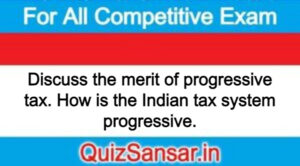
Discuss the merit of progressive tax. How is the Indian tax system progressive.
Discuss the merit of progressive tax. How is the Indian tax system progressive.
Ans.
Progressive Tax Rates
A schedule of progressive tax rate is one in which the rate of taxation increases (multiplier) as the tax base increases (multiplicand. As already stated, the amount of tax payable is calculated by multiplying the tax base with the tax rate. In the case of progressive tax, the multiplicant (income) increases.
Regressive Tax Rates
A schedule of regressive tax rate is one in taxation decreases as the tax base increases. The amount of tax payable is calculated by multiplying the tax base with the tax rate. In the case of regressive tax, the multiplier (tax rate) decreases as the multiplicant (income) increases.
It is thus obvious that in case of proportional tax, tax rate does not change with the increase in income, though the total amount of tax paid by the taxpayers increases as their income rises.
In case of progressive tax rates, the tax rate decreases as the income increases though the amount of money paid in taxation increases with the increase in income.
Arguments in favour of Progressive Taxation
The principle of progression in taxation has been universally accepted. The principle has been favoured by different writers on a number of grounds. some of which are as follows-
1. It has been justified on the ground that it secures equality in sacrifice and leads to justice in distribution of burden of taxation, as it is based on the principle of ability to pay. Moreover, the principle of ability to pay can be put into practice through progressive taxation. For instance, the deduction of Rs. 10 from A’s income of Rs. 100, and Rs. 10,000 from B’s income of Rs. 1,00,000 as tax, will bring greater sufferings on A than on B. In the other words, A has made greater sacrifice than B because the marginal utility of money decreases as the income increases. However, A and B, can make equal sacrifice; if B’s income is now subject to higher tax rate, say 40 percent instead of 10 per cent at present, and thus the deduction from B’s income would be Rs. 40,000 instead of Rs. 10,000. In this situation, A and B. may make more or less equal sacrifice.
2. Progressive taxation has been justified on the ground that it serves as a powerful instrument for reducing the inequalities of income. Professor Kaldor has also emphasized the role of progressive taxation to reduce the inequalities of income.
3. Progressive taxes have been justified on the ground that they are economical, as the cost of collection does not rise with increases in the rates of taxes.
4. Progressive taxes have also been justified on the ground that they are elastic; as the need of increased public revenue can easily be fulfilled by increasing the rates of taxes, i.e., the public revenue can be increased at any time by increasing the rates of taxes and vice versa.
5. Progressive taxes have been justified because the public revenue automatically increases with the increase in economic activities and income, since the rice in income is automatically taxed at higher rates under this system. 6. Progressive taxation may be helpful in curbing the inflationary trends, as it reduces consumption demand, and the resources, thus mobilised may be directed towards productive investment which may increase the supply of commodities. Hence, inflationary trend may be curbed, and economic growth and stability may be achieved.
7. Finally, the loss of satisfaction for the community as a whole will be minimum only under conditions of progressive tax system, as the principle of least sacrifice states that the sacrifice imposed upon the community as a whole will be the least. If the richer sections are taxed at high rates, and the poorer sections are either exempted from taxation or are taxed at low rates. Morever, Prof. Pigou pointed out that the basis of satisfaction of many rich people is not the amount of their wealth, but because they are relatively richer than others. Hence, if the income of all the rich people is reduced by way of progressive taxation and their relative position does not change, the loss of satisfaction of them will not he very great. Two persons, who are equally rich before paying the tax, will remain equally rich after paying the tax. Though both of them will lose a portion of their wealth through taxation, but they will continue to be as rich to each other as before, because their relative position is not changed. Hence the loss of satisfaction will not be much.
Hence, Prof. Taylor justified progressive taxation for its of the following advantages-1. Revenue productivity. 2. Optimum individual allocation of tax burden. 3. Promotion of stability and growth. 4. Optimum social allocation of resources.
Objections To Progressive Taxation
The following objections have been advanced against the policy of progressive taxation-
In the first place, it has been pointed out that progressive taxation is entirely arbitrary. There is no guiding principle to which tax rates are determined. There can be infinite scale of progression and no simple and intelligible reasons can be given for selecting one preference over others.
Secondly, progressive taxation is based on the assumption that marginal utility of money is less to a rich person as compared to a poor one. But satisfaction is a mental or psychological phenomena, one man’s satisfaction cannot be compared with anothers. Here, it should he noted that the law of diminishing marginal utility has been applied in the field of public finance on the assumption that human behaviour is similar under similar circumstances. However, there can be exceptions, but generally people placed in similar circumstances experience similar satisfaction, Hence, the application of progressive taxation is valid under the assumption that marginal utility of money to the rich people is less than that of the poor.
Thirdly, it has been argued that progressive taxation may adversely affect production and discourage capital formation. It may therefore, discourage the growth of industry. Mill pointed out that “to tax the higher incomes at higher percentage than smaller, is to lay a tax on industry and economy.” But, if the progressive taxation is not allowed to reach that point, when it may hamper the formation of capital and the growth of industry, there should be no basis for such apprehension. Moreover, it is said that progressive taxation does not affect the desire to save more as it is a tax on surpluses.
Fourthly, it is said that progressive taxation punishes prudence and virtue and rewards extravagane and idleness. William Newmarch said that graduation or progression is, “Confiscation, punishing prudence and virtue, taxing a man for being good to himself and doing good to others.” Similarly, J.S. Mill said that beyond a certain limit a graduated tax appeared to him to be an entirely unjust mode of taxation, and in fact a graduated robbery. Here, it should also be pointed out that large incomes, and large properties are not always the result of hard work and thrift. Moreover, large income and large properties may have been possible, because of existing social, economic, legal and public instruction and hence they must be taxed at progressive rates.
Finally, the danger of evasion is another objection. There would be very great efforts to evade a steeply graduated tax than to a proportional tax. There may be false declaration when there are special duties on the better kinds of goods, and in case of income and property taxes, the assesses can submit false returns. Hence, in case of progressive taxation, the motives for evasion would to stronger and means of prevention less effective then in case of a proportional tax.






